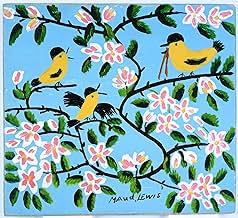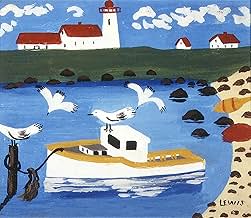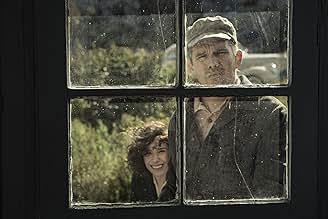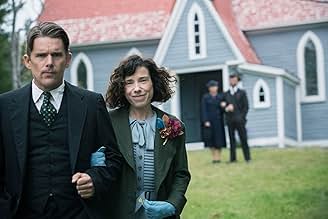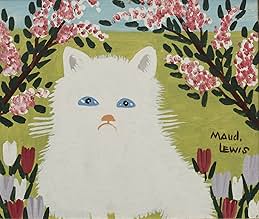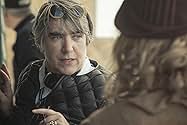Maudie
- 2016
- Tous publics
- 1h 55m
An arthritic Nova Scotia woman works as a housekeeper while she hones her skills as an artist and eventually becomes a beloved figure in the community.An arthritic Nova Scotia woman works as a housekeeper while she hones her skills as an artist and eventually becomes a beloved figure in the community.An arthritic Nova Scotia woman works as a housekeeper while she hones her skills as an artist and eventually becomes a beloved figure in the community.
- Awards
- 25 wins & 17 nominations total
Lisa Machin
- Nurse
- (uncredited)
- Director
- Writer
- All cast & crew
- Production, box office & more at IMDbPro
Featured reviews
For me, this is the reason I go to the movies. Always in the expectation that when I walk out of the theater I simply will not be touching the ground. This does not happen frequently, but with "Maudie" the magic occurred. An amazing story eloquently told. Sally Hawkins is superb, touching and profoundly human. Ethan Hawke is at his best. There is a believable chemistry between these battered beings. When they do take flight, they soar over this crude grandiose landscape so beautifully captured on film.
It's early, but the award community have a sure bet in this unforgettable gem.
It's early, but the award community have a sure bet in this unforgettable gem.
I think Sally Hawkins was great in this year's The Shape of Water. I understand why she's getting attention for it and I think she would be a fine nominee. But really, there's no question in my mind that it's her performance in Maudie that is the much more impressive overall. She gives a career-best turn here, a completely internal performance that could have been all showy, broad theatrics had a lesser actress gotten the part. She's absolutely amazing and in a fair world would be getting nominated (if not winning) for this work. Ethan Hawke is also fantastic, showing that he can really shine in character parts like this.
Folk Art is art that is not defined by your traditional academic notions of what art should be, whether technical or aesthetic. Folk is an old word, from old high German, basically meaning people in general.
"Maudie" is a movie about folks, especially one very important central figure who happens to be a folk artist. Maud Lewis is her name, and it's very likely she never classified her art by any term whatsoever during her life, much less folk art. Her art is just something she did.
"Maudie" is a sweet little biopic movie that at times is a bit disturbing. The disturbing aspects are subtle. The creators/directors gloss over some of the finer points of her life, with some alterations of the truth. However, the important questions are asked, literally, during the movie. It's up to the viewer to see these aspects, or not, and take them for what they are. Your reactions or discernment thereof may depend on prior knowledge or research of the subject.
What is clear from almost the outset the movie, is that Maud and her husband led a difficult life - not quite but almost abject poverty. Yet Maud filled her life with beauty through her art. Flickers of relative fame touched her life briefly, but it was not until well after her death in 1970 that full appreciation was recognized, not that she really cared about these things.
"Maudie" is a small movie with big performances by the mains, especially Sally Hawkins. In my opinion, her performance as Maud is the best this year so far, but I can guarantee right now that you will hear her name come Oscar time next year. Ethan Hawke is also exceptional as her husband Everett, although the role itself is a bit more static. The supporting cast - mostly unknowns - does well in more cardboard cut- out roles, but Matchett, a Canadian actress who you might recognize from some American TV roles does a nice job as one of her earliest patrons.
Will you like this movie? I don't know, but I loved it. It is what it is, not an action movie, but a small art-house drama/biopic of a very interesting and amazing person who lived most of her life in obscurity. This movie affected me not just during the viewing, with tears streaming slowly down my face, but well after. The tears that came were not only sad but also from joy at her creations, but most of all they stemmed from my belief that beauty and sweetness deserves beauty and sweetness and, well, Maud had very little of that in her life.
Many biopics have been made of famous people that rose out of obscurity or extremely challenging situations or disabilities to achieve greatness and renown. What really interested and touched me about Maud's story is there was no rise.
(Interesting side note: Maud sold her paintings during her life for a few coins to a few dollars at most. Now her paintings are selling for six figures)
"Maudie" is a movie about folks, especially one very important central figure who happens to be a folk artist. Maud Lewis is her name, and it's very likely she never classified her art by any term whatsoever during her life, much less folk art. Her art is just something she did.
"Maudie" is a sweet little biopic movie that at times is a bit disturbing. The disturbing aspects are subtle. The creators/directors gloss over some of the finer points of her life, with some alterations of the truth. However, the important questions are asked, literally, during the movie. It's up to the viewer to see these aspects, or not, and take them for what they are. Your reactions or discernment thereof may depend on prior knowledge or research of the subject.
What is clear from almost the outset the movie, is that Maud and her husband led a difficult life - not quite but almost abject poverty. Yet Maud filled her life with beauty through her art. Flickers of relative fame touched her life briefly, but it was not until well after her death in 1970 that full appreciation was recognized, not that she really cared about these things.
"Maudie" is a small movie with big performances by the mains, especially Sally Hawkins. In my opinion, her performance as Maud is the best this year so far, but I can guarantee right now that you will hear her name come Oscar time next year. Ethan Hawke is also exceptional as her husband Everett, although the role itself is a bit more static. The supporting cast - mostly unknowns - does well in more cardboard cut- out roles, but Matchett, a Canadian actress who you might recognize from some American TV roles does a nice job as one of her earliest patrons.
Will you like this movie? I don't know, but I loved it. It is what it is, not an action movie, but a small art-house drama/biopic of a very interesting and amazing person who lived most of her life in obscurity. This movie affected me not just during the viewing, with tears streaming slowly down my face, but well after. The tears that came were not only sad but also from joy at her creations, but most of all they stemmed from my belief that beauty and sweetness deserves beauty and sweetness and, well, Maud had very little of that in her life.
Many biopics have been made of famous people that rose out of obscurity or extremely challenging situations or disabilities to achieve greatness and renown. What really interested and touched me about Maud's story is there was no rise.
(Interesting side note: Maud sold her paintings during her life for a few coins to a few dollars at most. Now her paintings are selling for six figures)
I do NOT understand how it is possible that Sally Hawkins and Ethan Hawke went completely unnoticed by the Academy. It truly boggles my mind. All of the other reviews pretty much summed up my feelings for this film and the performances. I'm left speechless that NO NOMINATIONS WERE GIVEN!! How in the world did such incredible acting performances get unrecognized? Sally Hawkins was simply superb. Ethan Hawke was amazing. Maybe his best performance yet. This movie is a gem. Definite must-see. And you too, will be scratching your head as to WHY these amazing actors didn't get even the slightest nod. Wow.
There is quote by Kurt Vonnegut that comes to mind when I think of Maudie, the latest film based on the real life and times of an artist. "Practicing an art, no matter how well or badly, is a way to make your soul grow, for heaven's sake. Sing in the shower. Dance to the radio. Tell stories. Write a poem to a friend, even a lousy poem. Do it as well as you possibly can. You will get an enormous reward. You will have created something." That may sound like a backhanded compliment but if Maud Lewis was portrayed accurately in the film, I doubt she'll mind. To her painting wasn't a source of ego or pride. It was something she just did - to make herself happy - and if it made others happy all the better.
The film picks up with Maudie, played with understated sensitivity by Sally Hawkins, as she struggles and fails to earn the respect of her family. Despite her severe arthritis, Maudie answers an advert for a live-in maid and runs away. She moves in with and eventually marries the crotchety Everett Lewis (Hawke), a fishmonger who manages to put on a grim smile but once over the film's 40+ year time span. After a time living in Everett's dimly lit squalor, Maudie relights her passion for painting using abandoned cork board and the walls of her new home to paint continuously.
The true-life Maudie was eventually considered Canada's most popular and prolific folk artist; though one could hardly tell given the solitude that follows Maudie throughout her life. In the film, she remains isolated, largely due to her debilitating arthritis and painful shyness around strangers. There's one awkward scene early on where Maud struggles to shuffle out of a doorway and stick her head out long enough to compliment a woman's shoes. In that moment we realize her deep desire to be both accepted and left alone.
The film aptly compliment's the artist's own frailties and unconventionality with a strikingly brittle and unconventional love story. Maud's warmth towards Everett is sincere and unconditional. She sees in him, a beautiful person - an outcast like her who has been made wild by the cruelties of life but nevertheless deserves her love. As open as Maudie is to the inner-beauties of a warm sunset, Everett remains as cold and brutal as a winter storm. Yet every time he "puts a foot down," he wordlessly capitulates. He grumbles and erupts in objectively despicable behavior but Maud always seems to convince him that he's capable of love and being loved.
The film continues down this path of bittersweet co-dependence and as the relationship develops, we see the results of Maud's patience and virtue. Thanks to the remarkably assured cinematography of Guy Godfree, the film crackles with natural beauty and warmth of a cozy hearth. There are some truly breathtaking natural vistas on display here, which despite their expanse manage to feel intimate and idyllic.
As a film Maudie is certainly within the ranks of Mr. Turner (2014), My Left Foot (1989) and Lust for Life (1956). Much like those films, Maudie centers on the life of a tortured artist whose personal story tells something truly meaningful about the human condition. It also has a truly award-worthy performance by Sally Hawkins who is at this point in a class of her own.
The film picks up with Maudie, played with understated sensitivity by Sally Hawkins, as she struggles and fails to earn the respect of her family. Despite her severe arthritis, Maudie answers an advert for a live-in maid and runs away. She moves in with and eventually marries the crotchety Everett Lewis (Hawke), a fishmonger who manages to put on a grim smile but once over the film's 40+ year time span. After a time living in Everett's dimly lit squalor, Maudie relights her passion for painting using abandoned cork board and the walls of her new home to paint continuously.
The true-life Maudie was eventually considered Canada's most popular and prolific folk artist; though one could hardly tell given the solitude that follows Maudie throughout her life. In the film, she remains isolated, largely due to her debilitating arthritis and painful shyness around strangers. There's one awkward scene early on where Maud struggles to shuffle out of a doorway and stick her head out long enough to compliment a woman's shoes. In that moment we realize her deep desire to be both accepted and left alone.
The film aptly compliment's the artist's own frailties and unconventionality with a strikingly brittle and unconventional love story. Maud's warmth towards Everett is sincere and unconditional. She sees in him, a beautiful person - an outcast like her who has been made wild by the cruelties of life but nevertheless deserves her love. As open as Maudie is to the inner-beauties of a warm sunset, Everett remains as cold and brutal as a winter storm. Yet every time he "puts a foot down," he wordlessly capitulates. He grumbles and erupts in objectively despicable behavior but Maud always seems to convince him that he's capable of love and being loved.
The film continues down this path of bittersweet co-dependence and as the relationship develops, we see the results of Maud's patience and virtue. Thanks to the remarkably assured cinematography of Guy Godfree, the film crackles with natural beauty and warmth of a cozy hearth. There are some truly breathtaking natural vistas on display here, which despite their expanse manage to feel intimate and idyllic.
As a film Maudie is certainly within the ranks of Mr. Turner (2014), My Left Foot (1989) and Lust for Life (1956). Much like those films, Maudie centers on the life of a tortured artist whose personal story tells something truly meaningful about the human condition. It also has a truly award-worthy performance by Sally Hawkins who is at this point in a class of her own.
Did you know
- TriviaThe fully restored house of Maud Lewis is on permanent display in Halifax at the Art Gallery of Nova Scotia. The decorated house was saved from deterioration by a group of concerned local citizens, that went through a 25 year-long struggle to maintain the house.
- GoofsThe paint "tins" that Maudie is using look like modern aluminum pull-tab type containers not old sardine tin cans.
- Quotes
Mr. Davis (Shopkeeper): I don't know why people pay money for these, my five-year-old could do better.
Everett Lewis: Maybe. Maybe he could, but he didn't - Maud did. Brushes, please.
[slaps the coins on the counter]
Everett Lewis: You're an idiot.
- Crazy creditsA brief clip in the end credits shows the real Maud Lewis with husband, Everett, from a 1976 black and white short, "Maud Lewis: A World Without Shadows."
- SoundtracksWinding Back the Years
Written by Anders Lewén (as Anders Johan Greger Lewen)
Courtesy of FirstCom Music
- How long is Maudie?Powered by Alexa
Details
- Release date
- Countries of origin
- Official sites
- Language
- Also known as
- Maudie, el color de la vida
- Filming locations
- Production companies
- See more company credits at IMDbPro
Box office
- Budget
- €4,993,020 (estimated)
- Gross US & Canada
- $6,170,998
- Opening weekend US & Canada
- $45,920
- Apr 16, 2017
- Gross worldwide
- $11,534,327
- Runtime
- 1h 55m(115 min)
- Color
- Aspect ratio
- 1.85 : 1
Contribute to this page
Suggest an edit or add missing content







